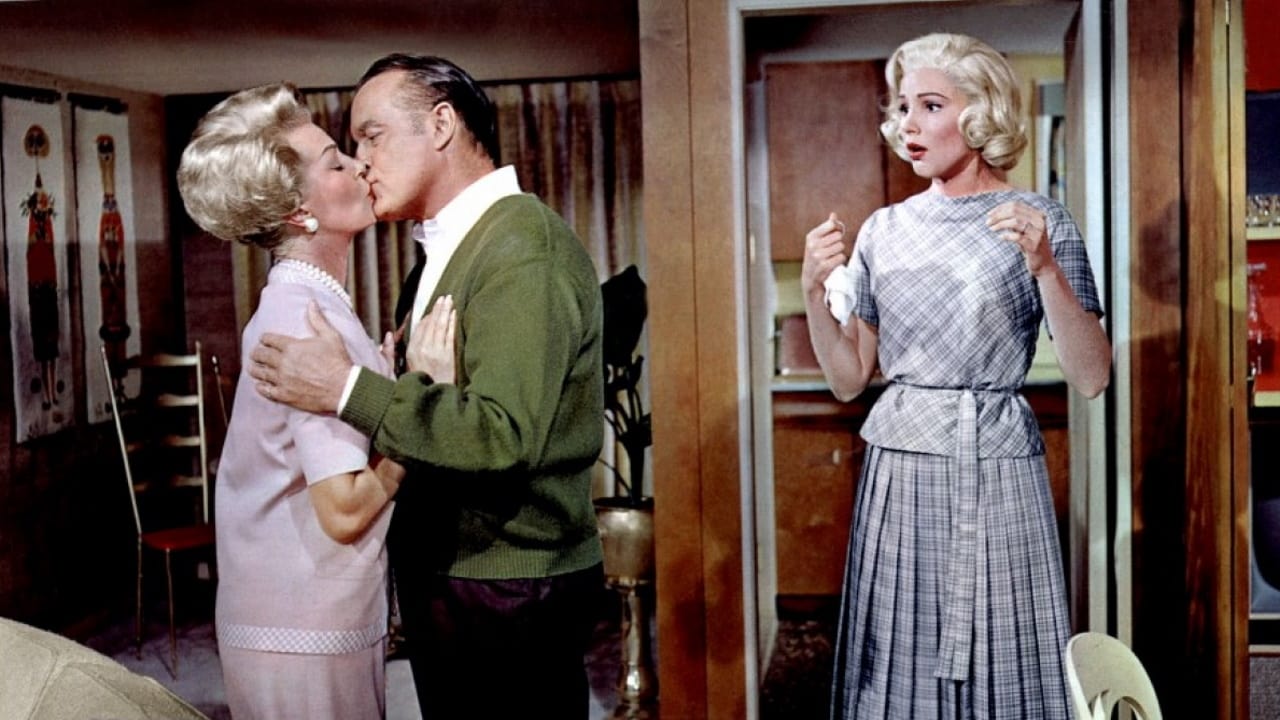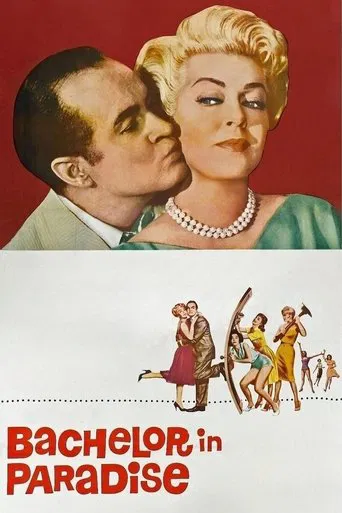

Long time ago I was surprised when I realized that the director of "Bachelor in Paradise", was the same person who made the masterpiece "The Incredible Shrinking Man", and the one behind cult classics as "It Came from Outer Space", "Creature from the Black Lagoon", and "Tarantula"; not to mention fillers as "Monster on the Campus", and hundreds of TV episodes from all kind of series, from "Dr. Kildare" to "The Love Boat". Arnold was not new to comedy: there are indeed comic elements on all the horror movies mentioned above, but moreover, a year before he started shooting this MGM glossy adaptation of a story by Vera Caspary (the same lady who wrote both "Laura", and "Les Girls"), director Jack Arnold --who I guess Andrew Sarris must have classified very low in his Olympus of filmmakers-- had a hit with the British comedy "The Mouse That Roared", with Peter Sellers playing different roles, including the Duchess of Fenwick, the senile ruler of the littlest country in Europe. It is a story of little people and little minds, treated with affection and a kind of humor far from what audiences laugh about today. "Bachelor in Paradise" is somehow in the same vein: it is a funny and affectionate view of how little minds react when confronted with different attitudes about sex, which --up until the days of the reign of the Hays film code-- was treated rather hypocritically in American cinema. Everybody was doing all type of positions and gender combinations, with all kinds of adornments, except "Hollywood creatures". For the early 1960s, though not as radical as it may sound, "Bachelor in Paradise" suggested sex was more fun than accepted in regular films, and this was its main attraction, not Bob Hope, Lana Turner, or the new coupling of Paula Prentiss and Jim Hutton. Even I, who was 10 years old and lived in the city, far away from a suburb like Paradise, found it more daring than the comedies in which Doris Day played a virgin with tired facial tricks, as 1959's "Pillow Talk", which incredibly won the Best Screenplay Academy Award. I had not seen "Bachelor in Paradise" in decades... but when I did again I found it decidedly proto-Altmanesque, the kind of comedy that Robert Altman would have been doing in the early 1960s, probably with a more acerbic approach. Only the music industry had teased us with multiple releases of the music Henry Mancini composed for the movie. Now we can watch "Bachelor in Paradise" again, restored, in wide-screen and the flat color cinematography of those years (with few exceptions, everything was as bright and clear as the images in television sets). However it must be seen with a 1961 frame of mind. If you had not been born yet, do a little research. It does help a lot to appreciate a film about sexual life of the Americans without showing what they were doing in cars, bedrooms, and bushes, when the movie was made.
... View MoreThis light comedy is all formula - see other reviews for the general plot. The most interesting aspects of it now are the locations, sets, props and general early 60's culture - lonely suburban housewives, swinging but somehow buttoned down bachelor, etc. Everyone drinking hard - built in bars, tiki lounge cocktails, gibsons, etc.The cars, in particular, are great. Check out the hair styles! Lana Turner has a helmet of blond surf. Hope's hair is like a raked zen garden.Hope reportedly was quite a swordsman in his day, and he tries hard to be a rake in this farce, but his sarcastic "jokes" are real duds and he clearly was too old for the emerging "cool".He also made a fortune in LA real estate putting up subdivisions like "Paradise Village". I wonder if these locations were shot on his development - more cash to Bob.
... View MoreBob Hope is a "Bachelor in Paradise" in this 1961 film also starring Lana Turner, Don Porter, Jim Hutton, Paula Prentiss, Janis Paige and Virginia Grey. Hope plays an author, A.J. Niles, whose specialty is the sexual practices of countries. When the IRS forbids him to leave the country, it's suggested that he concentrate on the U.S. He's sent to a development in California called Paradise and set up in a rental home. It's actually the home of one of the managers of the development, Rosemary Howard (Turner), and she lives elsewhere for the time being. Keeping his identity a secret, Adam, as he is called, holds seminars and discussion groups for the women of Paradise on how to keep their marriages fresh. Some of his advice works; some doesn't. Meanwhile, he's being pursued by the sexy but married Dolores Jynson, and he himself is after the beautiful Rosemary.This seems to be a very popular film with viewers who post here. I didn't make all the connections with it that some did as I don't come from this kind of background, but I can well appreciate how it would resonate if I had. It's a pleasant enough film, and it is a lot of fun to see all of the '60s furnishings, colors and styles of hair and dress and to realize how mores have changed with the years. The cast is very good (and very '60s) as well. People probably thought Prentiss and Hutton were married as they were paired together so often due to Prentiss' above average height, and it's always great to see Janis Paige and Virginia Grey.My favorite Bob Hope era is that of the 1940s, where he had great material well suited to him. His youthfulness and the cowardly character he played, along with the situations he got into always made his films sparkle. And what leading ladies - Madeline Carroll, Paulette Goddard, Dorothy Lamour, etc. Here he is teamed with glamorous Lana Turner who looks very beautiful in the film and has the right coolness and sophistication for the part. As for Hope, at the age of 58, he doesn't have that boyish, enthusiastic, naive quality of the old days, and the jokes he's delivering are pretty stale.Unlike "The Private Navy of Sgt. O'Farrell," "Bachelor in Paradise" is not a dud. Though it's dated, that's part of the fun, and it has some genuinely funny moments, a lively cast and that American icon, Bob Hope. You can love him or hate him, but you can't deny he was a remarkable entertainer to many generations.
... View MoreI saw this motion picture in 1961, and it stuck with me for a few reasons. I was raised in a tract neighborhood nearly identical to 'Paradise Village', so it's like 'going home'. Hope was never funnier along with Lana Turner, but Janis Paige was superb in her role as a 'seductress'. I'm told that Miss Turner had never been in a supermarket prior to the scenes of this picture...but she had so much fun after that, her daughter took her almost weekly to one. The music is spectacular, especially the Henry Mancini-penned theme at the beginning and end - it's the first piece of 'sophisticated scandalous' music I can remember hearing. Many shots of some great now-classic autos, as well(Dodge, Chrysler 300, etc.). Al in all, it's a 'dated' motion picture, but still funny and enjoyable to watch.
... View More